Style and flair
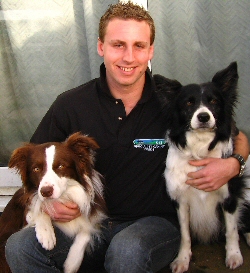 After
his recent successes at the end of last year and the beginning of this one, Soraya Porter
caught up with David Munnings, a man currently very much in demand, and that's when he's not
training his own dogs and studying at University! Having trapped the poor, unsuspecting soul,
she submitted him to a grilling on Agilitynet's behalf Here are the very interesting answers
she got to her questions: After
his recent successes at the end of last year and the beginning of this one, Soraya Porter
caught up with David Munnings, a man currently very much in demand, and that's when he's not
training his own dogs and studying at University! Having trapped the poor, unsuspecting soul,
she submitted him to a grilling on Agilitynet's behalf Here are the very interesting answers
she got to her questions:
Q. When and how did you first get into agility?
I got
into agility from my puppy obedience class. I had never seen or heard of Agility before, but I
enjoyed straight away.
Q. Tell us about your first dog.
My
first dog was a medium Springer Spaniel called Megan. She was very fast at the time, had
absolutely no contacts, unless she hit them by accident, and would never weave in the ring. She
also usually ran round the ring three times after the first jump! We had a lot of fun, but she
developed OCD in her hocks, so she had to retire at a young age.
Q. Tell
us about some of your early training problems.
I didn't really have
any early training problems as such. Any problems were just due to my lack of knowledge.
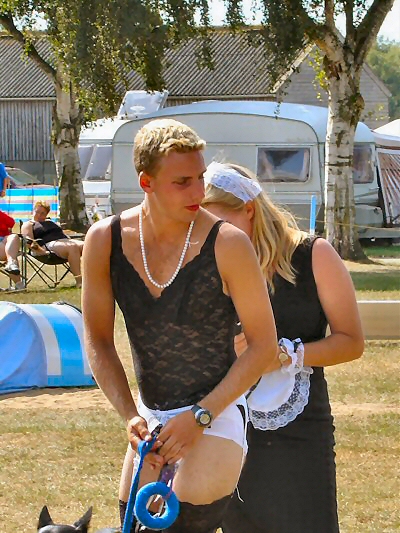 Q.
Can you tell us some more about your early days in agility? I believe you trained with Crazy
Maesy at a time when there were not many younger people competing seriously in agility. What
was that like? Q.
Can you tell us some more about your early days in agility? I believe you trained with Crazy
Maesy at a time when there were not many younger people competing seriously in agility. What
was that like?
I started
agility when I was 15 years old and got invited to join Crazy Maesy with my first rescue collie
when I was about 16 or 17. They really helped me out with my handling techniques and
understanding of agility and how to train other people.
There were
very few other young people around at the time. Natasha Wise and Jon Watts were the only other
two really competitive ones and they were a lot better than me. I think I did one Junior class
and they beat me by so much I didn't bother doing any more! I've always been able to mix with a
very varied age group so it wasn't too hard for me not to have many people my own age around.
Q. Can you
tell us a bit about your current dogs?
At the
moment I compete mainly with two dogs, Billy and Dobby. Billy is 10 this March, so will be
competing less and less. Most people already know the story behind how I got him. The short
version is that his owner went travelling for a year, and after the first six months he came to
stay with me. I ended up keeping him when Sophie came back, as he was so settled with me. She
didn't have time to take up agility with him again, and knew he would miss it.
He has
been my most successful dog, our main achievements being an Individual Bronze medal at the
World Championships in 2005, and winning my third Championship class in 2007, which got him his
Agility Champion title.
Dobby is just
three years old. He is half brother to Billy. He won into Senior after two months of competing
and won into Grade 7 in his first year of competing. He also won his first ever Championship
class he was eligible for. We competed at Crufts in the Champ class this year and won so he is
now an Agility Champion at just three years and three months old. He also won another Champ
class at Scunthorpe in April. He is a wonderful dog who is very special to me. I still can't
always believe he's mine!
Q.
What size
dogs do you run, and why?
All the
dogs I run are Large just because I love collies and wouldn't want another breed to do agility
with right now.
Q. Would you consider seriously
competing with one of the other sizes of dog?
I do love
Papillons. They're hilarious and a lot of fun, but I think that I'll stick to collies for now.
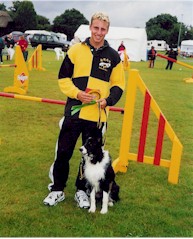 Q.
What got you really hooked on agility, and who were your biggest influences and mentors? Q.
What got you really hooked on agility, and who were your biggest influences and mentors?
I don't
think anything in particular got me hooked on agility. I just loved it from the start.
There
wasn't really anyone in agility whom I wanted to be like though there were obviously a few
handling styles I liked. I took a bit from each and eventually came up with my own which works
very well for me and for most of the people I train. It's simple to understand, and dogs pick
it up very easily. Jo and Iain Fraser were my first real trainers, and taught me about
consistency.
Q. Who or what would you say were your
biggest influences now?
Natasha
Wise is a big influence for me. I'm not an easy person to train nowadays, but she does it
better than anyone. We use the same methods for our dogs and have the same goals. Natasha has
been through a lot in the last two years but has still managed to stick with it, and bring out
her amazing puppy Dizzy.
Q. When did you realise you were
getting quite serious about competitions?
I realised I
was serious about agility when I gave up show jumping (horses), much to my mums disappointment.
I kept getting more dogs - five now - and bought a van. Having a smelly old van really isn't a
cool look, especially at Uni, but the dogs always come first!
Q. Is
there anything that you know now, that you wish you'd known when you first started to get more
involved in agility?
A lot of
stuff! But we all start off not knowing anything. We have to learn in our own way. We can't be
told everything from the beginning, or we wouldn't understand it. We learn from our mistakes.
The only
thing that I think is nearly essential for most dogs is to make them toy crazy. They have to
learn to work for their reward - not be so completely obsessed with it that they wont
concentrate, but want it enough that they will do nearly anything to get it!
Q. Do you suffer from competition
nerves, and if you do, how do you cope with them?
I don't
really suffer from nerves; it's more excitement. I love competing, and the bigger the crowd the
more I love it, so Finals are better for me. I just have to remember that I have trained my
dogs well, it's only a set of equipment, and I just have to guide them round. When I put it
like that to myself, I seem to just forget everything else and get on with it.
At the end of
the day, I do agility because I love it, not just to win - even though I do love to win! If it
goes wrong, it goes wrong. I'll still be going home with my dogs who will think they have won
whatever happens, and that's what's most important.
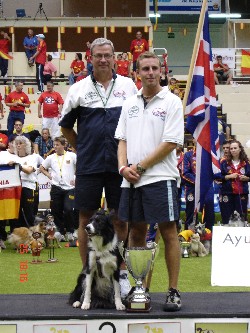 Q.
Do you have a particular routine you follow when you're competing? Q.
Do you have a particular routine you follow when you're competing?
As most of you might know, I'm
studying osteopathy and I'm in my final year now. I just
finished my
dissertation, the title of which was: - Direct comparisons of the time dogs take to run over
a set line of jumps both before and after an osteopathic treatment.
The researc I did was quite
interesting. On Week 1 30 dogs were run down a line of four jumps, spaced 5 metres apart with
their normal warm up routine. The times were recorded using hired electronic timing. Week 2,
half the dogs were run the same as the previous week and their times were all very similar. The
other 15 dogs were given a five minute treatment by a qualified osteopath which involved
articulating joints, stretching muscles, and oscillating the spine.
The research I did suggested that
muscles need to be held in the stretched position for 30 seconds to get the best results. The
aims of the treatment were to increase heart rate and, therefore, increase circulation so the
body had a good supply of fresh oxygenated blood for more energy. Also to stretch the muscles
and increase their elasticity and increase the mobility of the joints. Stretching the muscles
also decreases contraction allowing blood to circulate more freely through them.
The dogs that received the
treatment all had a statistically significant decrease in time, so an increase in performance.
The best time decrease was by 0.6 seconds which was massive considering most dogs were
completing it in an average of 2 seconds. Around a whole course the difference would be huge!
When I warm up my dogs before competition, I give them
all a similar treatment as well as an active warm up which involves running, turning, and
acceleration. People don't do enough warm
up before competing or training and a lot of dogs carry injuries because of it. Warm up is
essential for performance and for decreasing the risk of injuries.
Q. Do you prepare yourself and your dog differently if it's a
competition final?
No, exactly the
same. If I act differently, that's when things will go wrong.
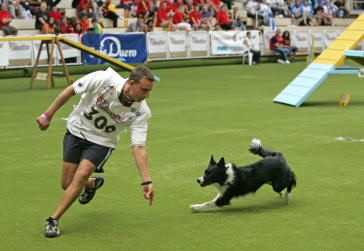 Q.
People watching an experienced handler often comment on how they make it look so easy. Would
you say you were still learning, and do you have any major issues you are working on at the
moment? Q.
People watching an experienced handler often comment on how they make it look so easy. Would
you say you were still learning, and do you have any major issues you are working on at the
moment?
I am always
learning, I have my style that I know works, but it's when people get stuck in their ways and
wont listen to new ideas that they start not doing so well. I will always listen to people's
ideas, especially if they are younger than me, as the ideas will be fresh. I will hopefully
continue to learn more about dog training as a whole until the day I give it all up.
I don't have any
major issues I'm working on at the moment, I'm just starting now to set harder courses for
Dobby as this will be his first proper season in Grade 7. Maybe I'll teach him to do a pull
through properly one of these days! I still see him as a baby and don't like to make him do
hard stuff in case he gets it wrong. He is an easy dog to train though; I have done all the
groundwork so as soon as I ask him to do something new, he picks it up very quickly from my
body language and commands.
Q. Do
you think that agility has changed since your days in Crazy Maesy, and if so, in what way?
Agility has changed loads since I started! Obviously the biggest change is the grading system,
which in some ways I think is great but in others I think it's completely wrong! There are
definitely a few bugs to work out with the system, but I think we're on the right track.
Training is the other big change; the standard of dogs in the UK has improved tremendously.
Q. Do you have a top
training tip?
Top training
tip... Make it fun and NEVER blame your dog. If it goes wrong, it's because you have handled it
wrong, or you haven't trained you dog properly in the first place. I hate to see people blaming
their dog when it was obviously their fault. That really annoys me.
Q. What advice would you give to someone who is just starting
out in the competitive circuit, who would love to eventually get to Crufts, Olympia or any of
the major Finals?
Come and train
with me.
Q. Do you set yourself goals, and if you do, can you
tell us any you have set for the 2008 Season?
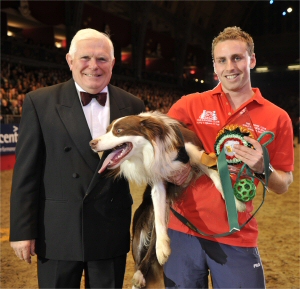 Ha
ha... yes! I set a lot of goals. This year my goals are all for Dobby as Billy is retiring
soon, and I'm just letting him enjoy himself nowadays. They are: - Ha
ha... yes! I set a lot of goals. This year my goals are all for Dobby as Billy is retiring
soon, and I'm just letting him enjoy himself nowadays. They are: -
-
To get to
Olympia
-
To win two more tickets (Done that
now.)
-
To make him an agility champ
(Done)
-
To qualify for
Crufts 2009
-
To get to the
WC's and European Opens
-
And obviously
to win!
Ha ha. It's a lot
of goals, but I know he is capable of them all, and it's only me I put the pressure on, never
him. He just always thinks agility is a massive game.
Q What are your thoughts about the future of Agility in the UK?
I hope it
won't change much more. I like it the way it is really.
The only
thing that worries me is how much it's growing. Shows are getting so big now and eventually I
think the number of competitors will have to be restricted. To get camping at some shows you
already have to enter 6 months almost in advance.
I think
agility here will become more like FCI agility, more and more of our courses resemble foreign
courses now and we have already lowered our jump heights. If I'm still doing it in another 10
years, ask me then. I'm sure I'll have lots more to talk about!
.jpg) Q.
And
finally……what is your favourite thing about Agility and why? Q.
And
finally……what is your favourite thing about Agility and why?
Being with
my dogs.
Thank you
David for agreeing to be interviewed. We all wish you the very best of luck for the 2008
season.
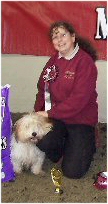 About
the interviewer... About
the interviewer...
Soraya
Porter lives in the smallest town in England - Manningtree, sharing her house with three
Siamese cats and her dog Ernest (Hartsfern In Earnest) who also can be heard answering to the
names of Ernie, Ern, Monster, Beast and Fish Face! Ernie runs at Grade 7, and has had many
appearances at Crufts, where he is in great demand to pose for photographs with Japanese
tourists!
Currently she trains
with Bob Sharpe and at Valley Farm Agility Club, as well as doing some freelance teaching, the
odd judging appointment, designing simple agility websites, and hand spinning dog fibre. Given
such ingrained insanity, it's a miracle that Ernie has taken part in as many Finals as he has.
First published 18 May 2008
|